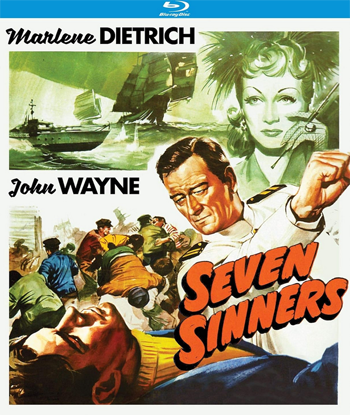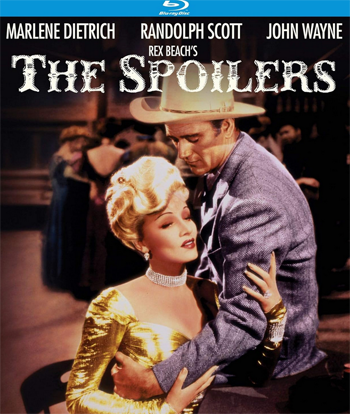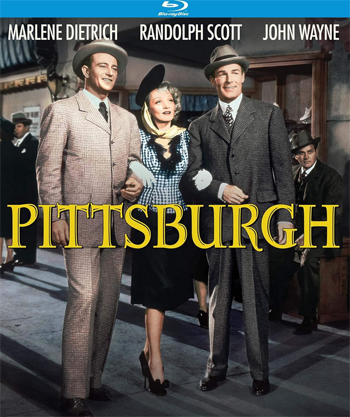
By Doug Oswald
John Wayne made three movies with Marlene Dietrich
between 1940 and 1942: “Seven Sinners” (1940), “The Spoilers” (1942) and “Pittsburgh”
(1942); the latter two also featured Randolph Scott. The years between 1940 and
the end of World War II were interesting for all three stars. The Duke and
Scott’s star status was rising, while Dietrich reached the peak of her star
power. Dietrich was already a superstar, having left Germany for Hollywood in
1930 and rising to become the highest paid actress in Hollywood. During this
period the Duke often received second or third billing after bigger names like
Dietrich and Scott which was the case in these three releases by Universal
Pictures available on Blu-ray via Kino Lorber.
First up is “Seven Sinners” from 1940 which is,
in my opinion, the best of the three films. It opens with the classic Universal
logo followed by a bar fight playing out behind the opening credits. Dietrich plays
Bijou, a sexy cabaret singer traveling from island to island in the south
Pacific on the eve of America’s involvement in WWII. She gets deported by the
ruling governor general for suspicion of prostitution and ends up on a ship
heading out to a new island. There she is joined by an assortment of riffraff,
grifters and con artists.
Bijou ends up on the fictional island of Boni
Komba and finds work at a bar named Seven Sinners. A U.S. Navy Lieutenant named
Dan, played by the Duke, catches her eye while she performs a spicey cabaret
number in which she’s wearing a tailored U.S. Navy style dress jacket, trousers
and hat while singing to a crowd of sailors. Samuel S. Hinds plays the American
island Governor who warns Dan of the dangers of romancing Bijou. She’s followed
around by Little Ned, played by Broderick Crawford, and con artist/magician
Tony, played by Billy Gilbert. Bijou also has a rival for her affection, Antro,
played by Oscar Homolka. “Seven Sinners” is clearly Dietrich’s film and she’s
terrific in it.
Marlene Dietrich had a very successful movie
career in both Germany and in the United States. Born on 27 December 1901 in
what is now Berlin, Germany, she got her start as a cabaret singer in the 1920s
which soon led to parts in silent movies. Her breakthrough was in Josef Von
Sternberg’s “The Blue Angel” where she played a seductive cabaret singer. Von Sternberg
brought her to Hollywood where she rose to become the biggest female star in
Hollywood. She co-starred with James Stewart in one of her greatest roles,
“Destry Rides Again” in 1939. She became a United States citizen and supported
the troops throughout WWII touring with the USO. Her entertainment career
peaked during the war and she made just a few movies in the 50s and 60s until
her death on 6 May 1992 in Paris.
While she remained married to Rudolf Sieber
until her death, it was a marriage in name only as she became notorious for her
very public affairs including speculation that The Duke became one of her romantic
partners. Known for playing cabaret singers and saloon girls, Dietrich’s film
highlights include “The Blue Angel” and “Morocco” (with Gary Cooper), both
directed by Von Sternberg, “No Highway in the Sky” again with Stewart, Billy
Wilder’s “A Foreign Affair” and “Witness for the Prosecution,” Alfred
Hitchcock’s “Stage Fright,” Orson Welles’ “Touch of Evil” with Charlton Heston,
and Stanley Kramer’s “Judgment at Nuremberg.” She also appeared in a cameo role
along with many Hollywood stars of the era in “Around the World in 80 Days.”
Her final two films were “Paris When it Sizzles” in 1964 and “Just a Gigolo” in
1978.
The film was directed by Tay Garnet, a World War
I aviator who started working in Hollywood in 1920 as a writer, directed many films
including “My Favorite Spy” with Bob Hope, “Bataan” with Robert Taylor, “The
Postman Always Rings Twice” with Lana Turner and John Garfield, “A Connecticut
Yankee in King Arthur’s Court” with Bing Crosby and dozens of television
episodes throughout the 50s and 60s, returning to feature films in the early 70s.
He also appeared uncredited in several of his movies including this one.
The Universal release made its way to theaters
in October of 1940. The movie is a light comedy playing out over 87 breezy
minutes. The movie looks very nice indeed on this Blu-ray edition by Kino
Lorber on a disc which includes an informative and entertaining audio
commentary track by David Del Valle and C. Courtney Joyner. While there has
been much speculation over the years over whether Dietrich and the Duke had a
fling, Del Valle downplays this as speculation and doubts the rumors were true.
The disc also includes the trailer for “Seven Sinners” and seven other Kino Lorber
releases. Highly recommended.

Next up is “The Spoilers”, which finds Dietrich
and the Duke in Nome, Alaska during the gold rush of 1900. This time they’re
joined by Randolph Scott in a rare bad guy role in a tale where most everyone in
the movie is bad except for Duke, Harry Cary and Dietrich. Based on the bestselling
novel by Rex Beach, the Duke plays Roy Glennister, a gold mining prospector. He
and his partner, Dextry (Harry Carey), team up with saloon girl Cherry Malotte
(Marlene Dietrich). They’re forced to protect their claim against the crooked
commissioner Alexander McNamara, played by Randolph Scott.
“The Spoilers” is a pseudo western taking place
in the Klondike and it comes with all the trappings of a traditional western
such as saloon fights, gun fights, horses, saloon girls and cowboys. “The Spoilers”
has the distinction of being the only John Wayne movie where the Duke is dressed
in women’s clothes and also the only time he appears in black face. It also has
one of the longest fight scenes ever filmed at almost four minutes between the
Duke and Scott.
Familiar faces on hand include Samuel S. Hinds
as Judge Horace Stillman, Russell Simpson as Flapjack Sims and Margaret Lindsay
as Helen Chester. The movie was directed by Ray Enright, who started work in
Hollywood as a teenager in 1913, served in the Signal Corps during WWI, and
working his way up as an editor, writer and director making dozens of feature
films through the mid-1950s.
Randolph Scott was born on 23 January 1898 in
Orange County, Virginia, and raised in Charlotte, North Carolina. He served as
an aviator during WWI in France, later played college football and after
graduating, caught the acting bug and moved to California where he eventually
received a contract at Paramount in 1929. Throughout the 1930s and 1940s, Scott
appeared in everything from comedies to dramas and adventure movies. In the
late 1940s he cemented his status as one of the most popular stars of westerns,
a genre he worked in almost exclusively starting in the late 1940s. He
especially shined in the seven westerns directed by Budd Boetticher starting
with “7 Men from Now” in 1956. Becoming one of the biggest box office draws of
the 1950s and early 60s, Scott retired from acting after the 1962 release of
the classic, “Ride the High Country” directed by Sam Peckinpah. A
multimillionaire due to his skilled investments, he lived in retirement with
his second wife until his death in 1987.
Released in June of 1942, the Universal release has
an 87-minute running time. The film looks and sounds very nice on this Blu-ray
release. Extras include an image gallery, trailers for this movie and seven
other Kino Lorber releases as well as an informative audio commentary by Toby
Roan where he shares lots of information about the production, such as this
being the fourth movie version of the Beach novel with another made in 1955 all
titled, what else, “The Spoilers.” A popular story indeed. The movie is the
least of the three Wayne and Dietrich films, but it’s a good rainy afternoon flick.
For my money, a better movie with a similar setting and subject is “North to
Alaska” also featuring the Duke.

The third Wayne and Dietrich pairing is “Pittsburgh”
which is not only the nickname of the Duke, but also the location of this 1942
release which takes place in the years leading up to WWII. The contemporary
drama (at the time) tells the story of two friends and the woman who comes
between them. The film opens at the start of America’s entry into WWII with
coal and iron works tycoons rallying the civilian workforce as military fighter
aircraft fly overhead. The movie flashes back to the two leads pushing a coal
cart in a mine shaft. The story follows the rise, fall and rise again of
Pittsburgh and his friendship with Scott and Dietrich.
Marlene Dietrich is Josie Winters who is known
by her nickname Hunky because she was raised in the Pennsylvania coal mining
region where the movie takes place. She meets up with Cash Evens (Randolph
Scott) and Pittsburgh Markham (Duke) while out on the town. Cash and Pittsburgh
head into a theater advertising a $100 in gold prize (about $1800 in today’s
dollars) to anyone able to knock out “Killer Kane.” A fight breaks out in the
theater with Cash and Pittsburgh making a getaway. The movie takes a turn away
from the comedy of the first act to more serious drama as a coal mining cave in
results in Josie joining Cash and Pittsburgh in rescuing their friend, “Doc”
Powers (Frank Craven).
The Doc is a genius when it comes to finding
different uses for coal from plastics to life saving medical applications.
Teaming up with Doc Powers, Cash and Pittsburgh form a corporation and with
Josie they start their rise to the top. Their main investor is the wealthy steel
magnet Morgan Prentis (Samuel S. Hinds) who also happens to have a pretty daughter,
Shannon Prentiss (Louis Allbritton), who catches the eye of Pittsburgh. He
marries Shannon for upward mobility rather than love and forgets his friends
and the many promises he made along the way.
Pittsburgh’s rise, fall and rise again are the
core of the story as we follow him in his journey. Pittsburgh becomes a better
man as the film comes to its hopeful conclusion assisting with the war effort.
Walking arm in arm with Scott and Dietrich, Pittsburgh provides the final line,
“I love you Cash. So help me, I love you.”
The
Duke is the lead here and he acquits himself quite well in a role that moves
from comedy to drama. Marion Morrison was born on 26 May 1907 in Winterset
Iowa. Known as “Duke” Morrison, his family moved to Southern California where
Duke entered college on a football scholarship from 1925 to 1927. Tom Mix
helped get Duke a summer job as a prop man in Hollywood where he eventually met
John Ford. The Duke appeared in over 70 low budget movies in the 1930s, mostly
westerns billed as John Wayne, until his breakthrough role in the 1939 classic
“Stagecoach.” His star rose in the 1940s where he remained a top box office star
into the 1970s and he remains a legend to this day.
The film was directed by Lewis Seiler, who
helmed dozens of movies from the silent era until he retired in 1959. He is
best remembered for his gangster movies and one of the best war movies made
during the WWII, “Guadalcanal Diary” in 1943.
The Universal release comes in at 92-minutes and
was released in December 1942, a full year into America’s entry into WWII. The
movie contains the typical propaganda of the time, specifically in the American
steel and coal industries, and veers from straight drama to comedy. Shemp
Howard of The Three Stooges fame makes a cameo as a tailor in the first part of
the movie. The Kino Lorber release looks very good and the movie has an
impresive performance by The Duke. The disc includes an image gallery and the
trailers for this and seven other Kino Lorber releases.
All three Kino Lorber
releases are in black and white and offer The Duke in three films pairing him
with Marlene Dietrich. The Duke is second and third billed here, but is a
standout in all three. While not the classics like many John Wayne films that
followed, these three movies are enjoyable and recommended, with “Seven Sinners” being the
best of the three.
Click here to order "Seven Sinners" from Amazon.
Click here to order "The Spoilers" from Amazon
Click here to order "Pittsburgh" from Amazon